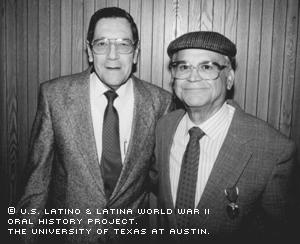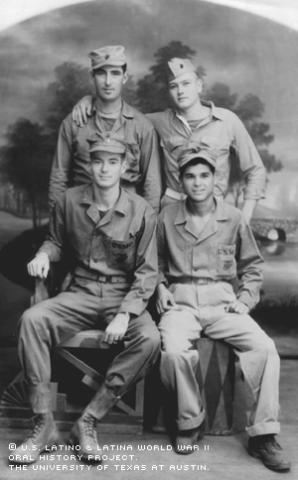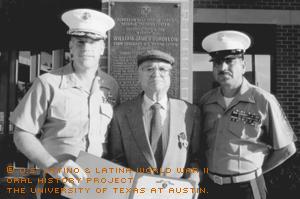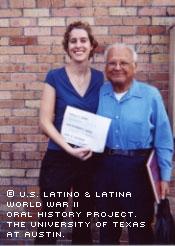



By Jennifer Lindgren
Jesus Herrera risked his life as a Navy corpsman in Okinawa in May of 1945, assisting wounded soldiers under heavy enemy fire and, twice, rescuing hurt Marines and helping them to safety – while still under fire.
For Herrera’s heroism, he earned a Bronze Star Medal, with a V for valor. He was still a baby-faced 18-year-old at the time. Today, he dismisses the importance of what he did back then.
"It was the job I was sent to do," Herrera said.
However, his job as a Pharmacist's Mate First Class in the Navy wasn’t one he had to do. He wasn’t drafted. In fact, at only 16 years of age, he lied about his age to join up.
Herrera and his two best friends, Julian Rubio and Willie Gonzales, were restless 10th graders at Sidney Lanier High School in San Antonio, Texas. After reading a brochure about the Navy, the trio decided to join -- even if they had to fib about their ages.
The three piled onto the bicycle they shared, and with Willie riding on the handlebars, Jesus balancing on the frame and Julian pedaling, they rode all the way to a recruiting station at a post office in San Antonio.
Herrera was a quarter pound below the 110-pound minimum requirement, and wouldn’t be admitted. His two friends, however, went off to training without him. The next week he tried again and still didn’t make the weight, but the officers let him pass.
"They let me in because I was eager," Herrera recalled.
A high score on an entrance test landed him in Hospital Corps school for the Navy in San Diego, Calif., where he trained in first aid, medicine and administering injections.
After training, he was assigned to a naval hospital in San Diego, and then to the destroyer base in the same city. He was then drafted into the Marines for boot camp, and then sent to Field Medical school. When he first joined the 1st Marine Division, he was the only Latino in his company.
At Pavuvu in the Russell Islands, he joined the 3d Platoon as its corpsman. Looking at the big picture, he was in Fox Company, 2d Batallion, 7th Regiment, 1st Marine Division, part of the 10th Army that invaded Okinawa.
Herrera saw jumpy young soldiers make mistakes that cost lives: A man loaded a weapon incorrectly, and it exploded in his hands; another man killed two members of his own company, because his nerves were frayed to the point that he fired at anything.
The horrors of war hit home with Herrera.
"It was Christmas Eve, and we were in the jungle, in foxholes," he said. "I was by myself ... water up to my neck. I watched as the flares would go up and light up the night sky, then quietly extinguished by rain.
"The guy in the hole next to me said, 'Hey ... it's midnight; Merry Christmas, buddy,'" Herrera recalled. "I said, 'Merry Christmas,' and the tears started coming."
Soon after, Herrera was sent to the island of Okinawa, the site of one of the longest battles at the end of World War II.
He recalls a lot of tension on his ship as it approached Okinawa in March of 1945. On March 31, the night before landing, the soldiers were told to go to bed at 7 p.m. to be ready at 1 a.m. the next morning.
"When you go through a big landing, it builds up a lot of tension," Herrera explained. "I remember not being hungry, and just drinking coffee at 1 a.m."
At 7 a.m., on an April 1st that was both an Easter Sunday and an April Fools' Day, red, blue, green and yellow flags signaled the launch for Herrera. He remembers hardly being able to see the land as the boat bounced through the choppy waters to shore.
"The smoke ... airplanes were bombing, battleships were shooting, kamikazes were terrible," Herrera said.
Once they reached the shore, Corpsman Herrera hit the ground running and didn’t stop moving for days. It was his job to tend to the wounds of soldiers injured on the frontlines, and pull them to safety. Herrera was called in every direction to rescue someone during the days of the battle.
He recalls seeing men burned alive; men who lost their eyesight; men who lost their legs. All turned to Herrera to save them.
In that situation you simply “go forward," Herrera said. "You're not looking. I just prayed and prayed and prayed."
His friend, another medic named Billy Moore, shared the same foxhole. They took turns running out to tend to the wounded. Billy was killed by friendly fire in Okinawa, and Herrera refused to leave him out in the line of fire.
"I remember running, shouting 'Corpsman down the line! Corpsman down the line!' because the Marines were all firing," Herrera said.
Herrera took Moore back to the foxhole and slept there next to him all night long, even though he was dead.
"Respect for the dead, he was a human being," Herrera explained.
When the battle was over, out of 255 men in his company, only 16 were still in fighting shape: Everyone else was dead or wounded. Herrera was the only corpsman left out of the original seven.
In June of 1945, he was knocked unconscious by a Japanese shell and was hospitalized for 10 days. The injury caused him a loss of hearing.
However, the same determination Herrera used to get into the Navy helped him survive. In the fall of 1945, he was still in Okinawa. He had enough points to be shipped back home, but was declared essential and was shipped to China, to assist in the liberation of Japanese prisoners.
He was then assigned to coal-shipping trains, which would haul coal from China to Manchuria. Herrera recalls riding on the tops of coal cars, exposed to below-zero temperatures, and sometimes having to sit and wait in these conditions when the trains would derail -- all this while being shot at by Communists from the nearby hills.
He was finally discharged on May 6, 1946.
Herrera later campaigned to receive the Purple Heart for the injury that caused his hearing loss. Finally, in October of 1994, he received his Purple Heart, in a special ceremony.
Back in San Antonio, Herrera worked for a while with his father, a carpenter.
It took him 11 years of night classes, but he earned his bachelor's degree in English from St. Mary University in 1962. He taught various levels of English for six years, including English as a Second Language to those trying to gain citizenship. Herrera worked as a proofreader at Kelly Air Force Base, and then began to manage apartments, which he continues to do today.
Mr. Herrera was interviewed in San Antonio, Texas, on October 25, 2003, by Jane O’Brien.

